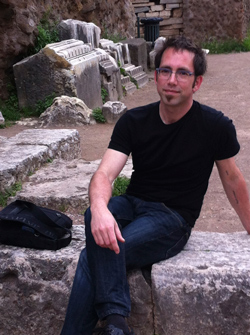Did you memorize a poem in school, and can you still recite it from memory?
This teaching technique is one of the subjects of Mike Chasar’s recent essay in “Poetry” magazine. Among much else, “Orality, Literacy, and the Memorized Poem” considers the effects of memorizing poems and the gradual disappearance of this requirement from school curricula.
While the memorized poem is being cut from teachers’ lesson plans, everyday encounters with poetry are growing in diversity. From nursery rhymes and playground chants to poetry slams, music, greeting cards, advertisements, and segments in television shows such as “Breaking Bad” or “Mad Men,” poetry forms an unexpected chorus of our pop culture.
Chasar recognized as an undergraduate that some poetic voices go unacknowledged—or unheard. He wondered why particular poems were published and taught, why others weren’t, and why some poems were set to music. These questions eventually led him to graduate school and fueled his research.
For his 2012 book, “Everyday Reading: Poetry and Popular Culture in Modern America,” Chasar gathered and studied 19th and 20th century poetry scrapbooks, letters, greeting cards, billboard advertisements, transcripts of poetry radio shows, and other non-canonical sources of popular poems. These sources serve to highlight and reveal cultural values, and they provide a foundation for evaluating the changing way we conceive of poetry. In some cases, they were the “Top 40” of their times.
Chasar’s next book mirrors this approach. Tentatively titled, “Beyond the Book: Poetry and New Media in Modern America,” it will examine the relationship between poetry and non-print mass media like film, television, and the internet. As print makes way for other media forms, how will poetry evolve? What becomes of poetry in a media-rich digital context?
“Skinhead,” by renowned slam poet Patricia Smith, offers students in Chasar’s Modern Poetry and Poetics class an example of this evolving relationship between mass media and poetry.
“Smith is an African American woman, and the poem is from the perspective of a white working-class skinhead,” Chasar says. “First, look up and read the digitized version of the print poem, and then watch her perform it.” The profound work becomes even more moving and thought provoking as a performance on HBO’s “Def Poetry Jam.”
Though the memorized poem has faded as a regular part of students’ experience in American schools, poetry in the larger culture has not, Chasar says. Poetry is changing. Audiences are changing. “How you distribute the poem, how a poem gets circulated, who is voicing it, and who is engaging with it, all affect the text of the poem itself,” Chasar says.
He takes this broad perspective into his modern poetry class, balancing canonical “poetry” with the concept of many “poetries.” “I don’t want us to be myopic — to only focus on one type of poetry,” Chasar says. “I want to think about the way poetic language functions in all aspects of our lives.”


